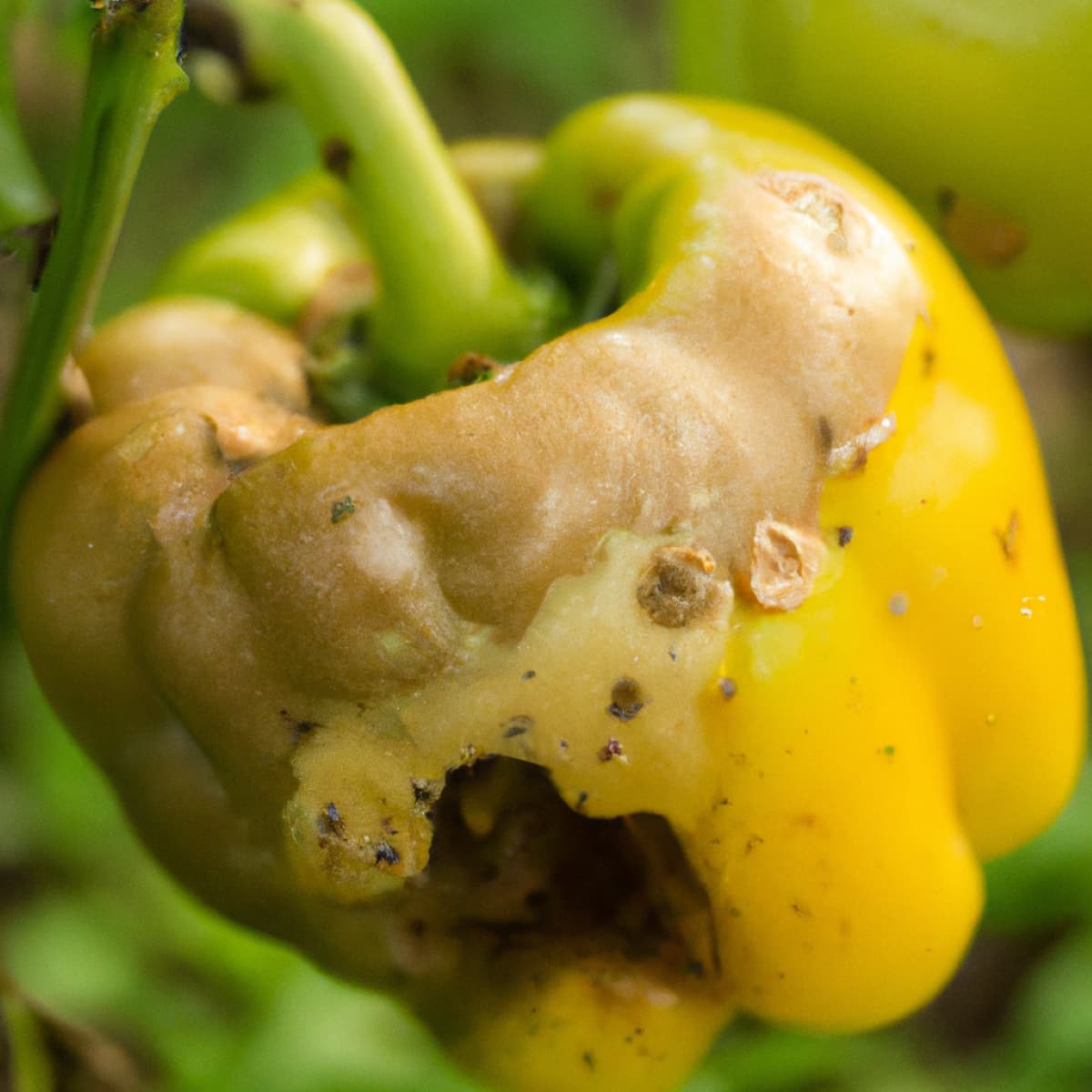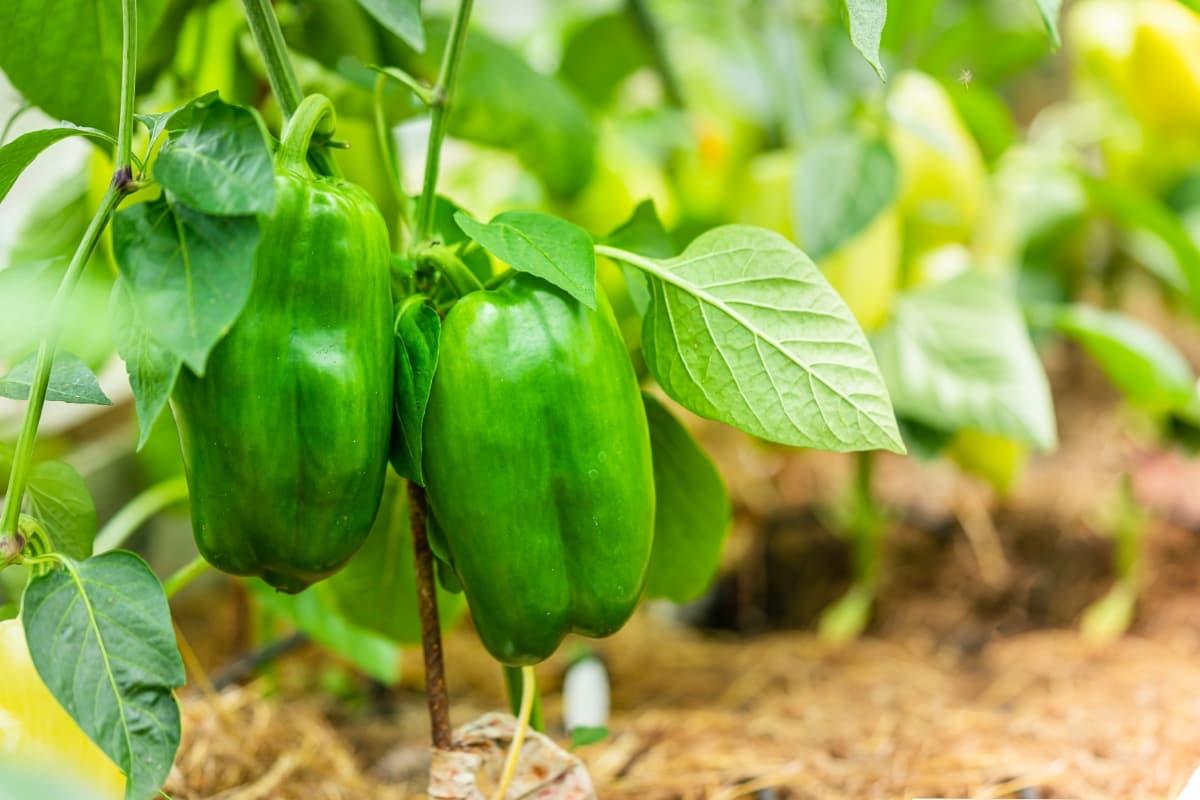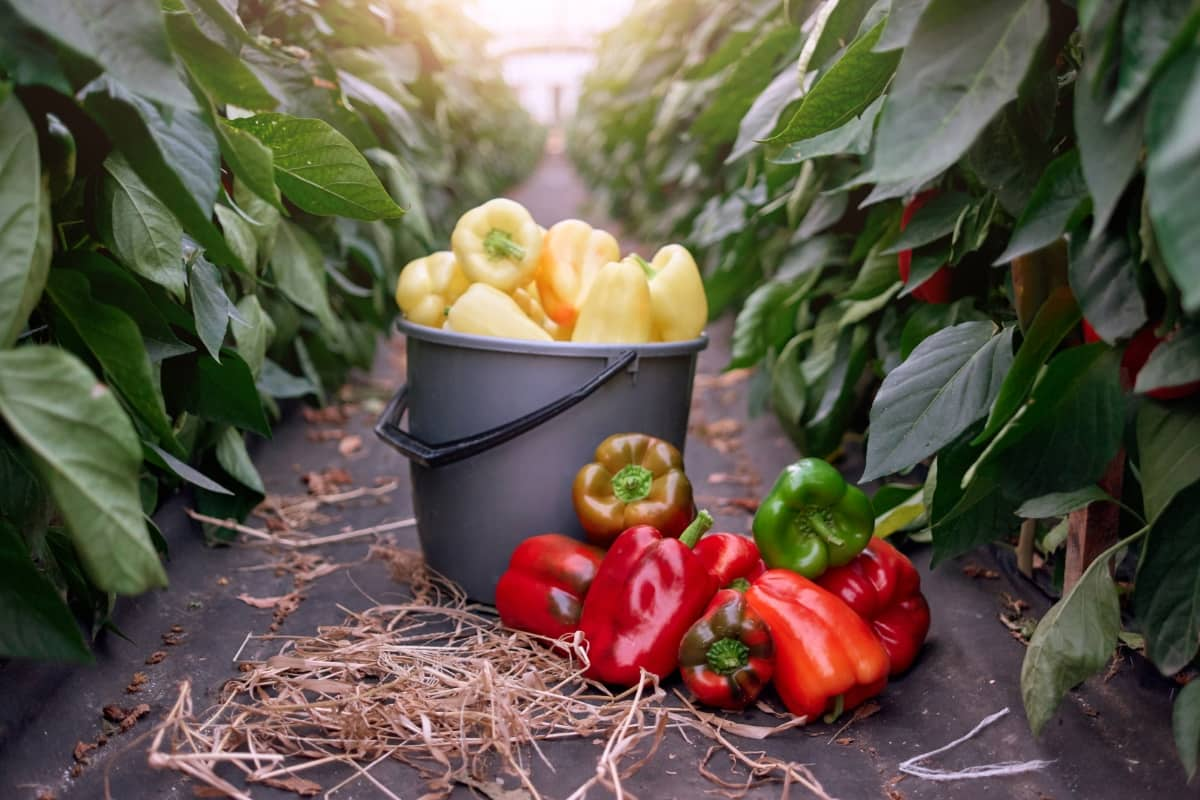Bell Peppers can be susceptible to various diseases. These diseases can cause stunted growth, discoloration, and even plant death. As gardeners and farmers strive for healthy crops, finding effective treatments for Bell Pepper diseases becomes crucial. Bell Peppers are a popular vegetable in many households. Knowing the different types of Bell Pepper diseases can help you identify them early and take effective measures to prevent further damage.

Treatment for Bell Pepper Diseases
Natural Remedies for Bell Pepper Diseases
Natural remedies are an excellent way to deal with Bell Pepper diseases without resorting to harmful chemicals. One of the best natural solutions is Neem oil, which can be used as a fungicide and insecticide. Another effective remedy for Bell Pepper diseases is baking soda solution. Mix one tablespoon of baking soda in a gallon of water and spray it on the plants to prevent fungal infections like powdery mildew.
Compost tea is another natural solution for preventing or treating various diseases in Bell Peppers. Compost tea provides essential nutrients to your plants while boosting their immunity against pathogens. Epsom salt is also beneficial for maintaining healthy plant growth by providing magnesium sulfate, which helps produce chlorophyll molecules necessary for photosynthesis in plants.
Best Fungicides for Bell Pepper Diseases
Bell Pepper plants are prone to fungal infections that can rapidly spread throughout the garden. Fortunately, various fungicides can help control these diseases and protect your Bell Pepper crops. One of the most effective fungicides for Bell Peppers is copper-based. This type of fungicide works by interfering with the growth processes of fungi and preventing them from spreading further.
It also helps maintain healthy plant tissues, making it an excellent choice for treatment and prevention. Another popular option is sulfur-based fungicides. These work by inhibiting fungal cell growth and disrupting their metabolic processes. They’re particularly useful against powdery mildew, which often afflicts Bell Peppers during hot and dry weather.
Controlling Common Diseases in Bell Peppers
Controlling common diseases in Bell Peppers is crucial for successful pepper production. Several diseases can affect the growth and yield of Bell Peppers, including bacterial spot, blossom end rot, and anthracnose. Practicing proper sanitation by removing infected plant debris and rotating crops is important to prevent bacterial spots. Copper-based fungicides can also be used as a preventative measure.
A calcium deficiency in the soil causes blossom end rot. To control this disease, ensure your plants receive adequate moisture and nutrients throughout their growing season. Anthracnose can be prevented by planting resistant Bell Peppers and practicing good crop rotation techniques.
Another common disease in Bell Peppers is verticillium wilt, which causes wilting and yellowing of leaves. This fungal disease can often lead to stunted growth or death of the plant. The best way to control this disease is through preventative measures such as crop rotation and using soil borne pathogen-resistant strains of Bell Pepper seeds. Taking precautions against common diseases in Bell Peppers, growers will increase their chance of successful production yields while minimizing losses due to pests or infections.
Organic Solutions for Bell Pepper Disease Management
Organic solutions for Bell Pepper disease management are becoming increasingly popular among gardeners and farmers. One of the most effective organic solutions is compost tea. Compost tea contains beneficial microorganisms that can help suppress harmful pathogens in the soil.
In case you missed it: Hydroponic Capsicum/Bell Pepper Farming in a Greenhouse: Key Rules to Start from Scratch

Using companion planting techniques can also be an effective way to manage diseases naturally. For example, planting marigolds alongside Bell Peppers can help repel pests and attract beneficial insects like ladybugs and lacewings. Crop rotation is another important strategy for managing diseases organically. Rotating crops helps prevent soil-borne pathogens from building up over time by breaking their life cycle.
Preventing and Treating Bell Pepper Bacterial Infections
Bacterial spot is one of the most common bacterial infections affecting Bell Peppers. This disease can cause significant damage to crops, resulting in yield losses and decreased quality of produce. The bacteria that cause this infection can survive in plant debris and soil for several years. To prevent the spread of bacterial spot, it’s important to practice good crop sanitation by removing infected plant debris from fields and greenhouses.
Additionally, avoiding overhead irrigation can help reduce the spread of water-borne bacteria. If you notice symptoms such as dark spots on leaves or fruit, it’s crucial to act quickly. Copper-based fungicides have been shown to effectively control bacterial spot when applied early in the growing season before symptoms appear.
Another effective way to manage bacterial infections is through beneficial microbes, which compete with harmful bacteria for resources and create an environment less conducive to pathogen growth. Preventing and treating Bell Pepper bacterial infections requires a combination of good cultural practices, timely intervention with appropriate treatments, and ongoing management strategies throughout the growing season.
Managing Bell Pepper Viruses with Targeted Remedies
Bell Pepper viruses are a serious threat to the growth and productivity of your plants. One effective remedy is to use insecticides that target the pests that spread the virus. These include aphids, whiteflies, and thrips. You can reduce the risk of viral transmission by eliminating these insects from your garden or greenhouse.
You can also use foliar sprays containing neem oil or garlic extracts. These natural compounds have been found to have antiviral properties and may help prevent virus infection in your Bell Peppers. In addition to targeted remedies, it’s important to take preventive measures such as maintaining good sanitation practices in your garden or greenhouse.
Promising Treatments for Bell Pepper Phytophthora
Phytophthora is a fungal disease that can cause Bell Pepper plants’ wilting, yellowing, and death. This disease can spread easily through water and soil. However, growers can utilize some promising treatments for this disease. One of the most effective methods to manage Phytophthora is crop rotation. By rotating crops regularly, you prevent the build-up of pathogens in the soil and reduce the likelihood of infection in future plantings.
Another method is to use resistant cultivars. There are many varieties available that have been bred specifically for their resistance to Phytophthora and other diseases. These cultivars may be more expensive than others, but they pay off because of their higher yield potential. Fungicides also offer an effective treatment option against Phytophthora. Cultural practices like maintaining proper drainage levels and avoiding over-irrigation can also help mitigate the spread of Phytophthora within your Bell Pepper crops.
Preventing and Controlling Bell Pepper Powdery Mildew
Bell Pepper powdery mildew is a fungal disease that affects Bell Peppers, causing white, powdery growth on the leaves and stems. This disease can stunt plant growth and reduce yields if not managed properly. Make sure to space your plants adequately so that they have proper air circulation around them. Additionally, avoid overhead watering as it can promote fungal growth. Another way to prevent powdery mildew is by choosing resistant varieties of Bell Peppers when planting in your garden.
In case you missed it: How to Increase Female Flowers in Capsicum/Bell Pepper: Explained in 10 Simple Steps

Some varieties have been bred specifically to resist this particular fungus. Remove any infected leaves or stems immediately and dispose of them from the garden area. You should also consider spraying with an organic fungicide like neem oil or sulfur-based products for effective control. In addition, milk spray has shown great results in effectively controlling this issue without harming other beneficial insects in your garden patch. It works by changing the pH level on the leaf’s surface layer of the leaf thus preventing fungus spores from settling onto it, reducing infection rates significantly.
Conclusion
Treating and preventing Bell Pepper diseases can be achieved through natural and organic solutions. Various diseases can affect Bell Peppers and cause significant damage to your crop. However, the good news is that many natural and organic solutions can effectively treat the problems without damaging the environment or compromising human health.
- Ultimate Guide to Ossabaw Island Hog: Breeding, Raising, Diet, and Care
- Ultimate Guide to Juliana Pig: Raising Facts, Size, Diet, Care, and Lifespan
- Raising Lleyn Sheep: Disadvantages, Price, Uses, Characteristics, and Care
- Ultimate Guide to Meishan Pig: Breed Facts, Breeding, Raising, and Care
- Ultimate Guide to Teacup Pigs: Raising, Diet, Lifespan, Cost, and Care
- Guide to Raising Poll Dorset Sheep: Facts, Profile, Characteristics, Uses, and Care
- Ultimate Guide to Bighorn Sheep: Characteristics, Diet, Lifespan, Breeding, and Lifecycle
- Ultimate Guide to Raising Katahdin Sheep: Farming Facts, Breed Profile, Uses, and Care
- Ultimate Guide to Raising Oreo Cows: Belted Galloways Farming Facts, Profile, Uses, and Care